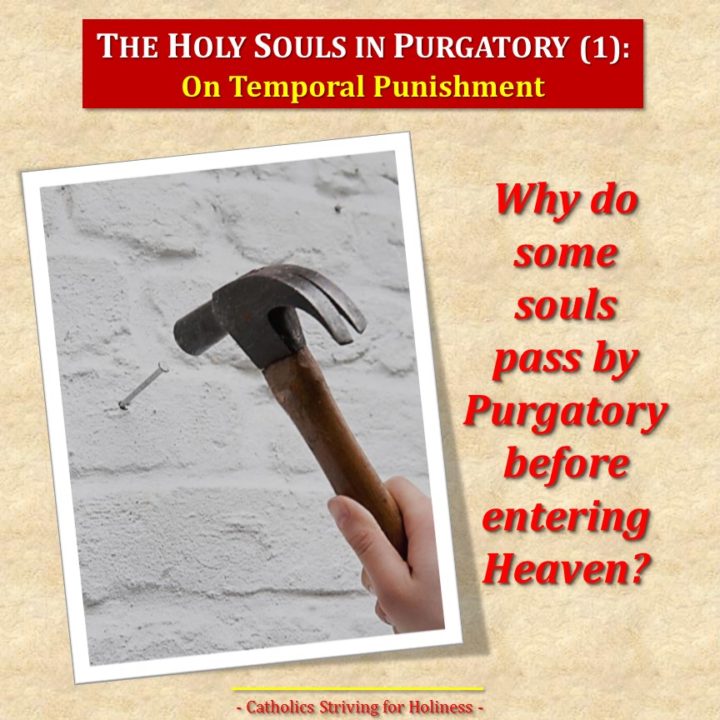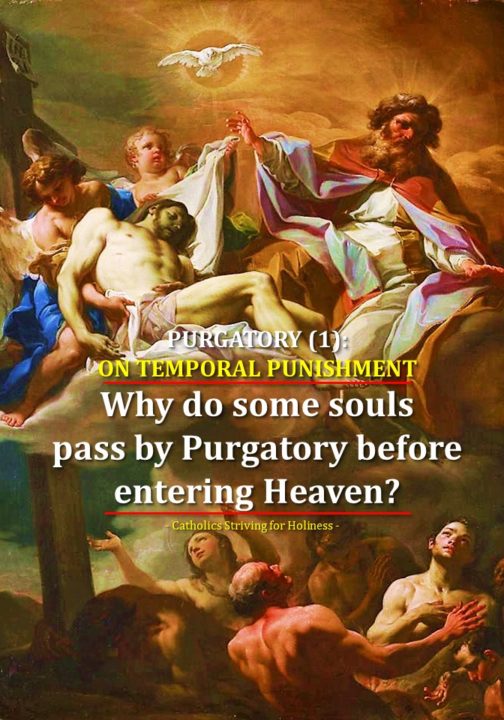THE HOLY SOULS IN PURGATORY (1).
On Sin and Temporal Punishment
WHAT DO THEY HAVE TO PURIFY THEMSELVES OF IF THEY HAD ALREADY DIED IN GOD’S FRIENDSHIP, WITHOUT MORTAL SINS?
- Even if they died without mortal sins, and thus in God’s friendship, they may have had VENIAL SINS at the moment of their death which still need to be purified.
- Moreover, they have to purify themselves of the TEMPORAL PUNISHMENTS which were left in the soul by the mortal and venial sins they had committed and had already been forgiven in the Sacrament of Confession.
- Although mortal and venial sins had already been absolved and forgiven in the Sacrament of confession, the so-called TEMPORAL PUNISHMENTS caused by them still remain in the soul. These need to be PURIFIED and PURGED during ONE’S LIFETIME HERE ON EARTH or in the NEXT (as in the case of the souls in purgatory).
I have always employed a simple analogy to young and old alike to understand this better:
THE HAMMER (our free will), THE NAIL (the sin), THE WALL (our soul) AND THE HOLE (temporal punishment).

- Imagine yourself hammering a nail on the wall. The ACT OF HAMMERING is your DELIBERATE DECISION TO COMMIT A SIN (whether mortal or venial); the NAIL represents the SIN; and the WALL, your SOUL.
- But you repented doing so and decided to remove the nail (sin) from the wall (soul). The ACT OF REMOVING THE NAIL represent your contrition, the confession of your sins and being forgiven from them in the SACRAMENT OF PENANCE: now you are in God’s friendship with your mortal and venial sins forgiven.
- -But what remains on the wall (soul)? The HOLE (REMNANTS OF SIN = TEMPORAL PUNISHMENT). The hole needs to be “covered”, “get rid of” or “repaired”,: hence, purification or purgation. How? Through the various acts below.
HOW CAN WE PURIFY OURSELVES FROM THE REMNANTS OF SIN (“HOLES” = TEMPORAL PUNISHMENT) IN OUR SOUL?
We can purify ourselves here on earth through PRAYER, in the HOLY MASS, ALMS-GIVING, SACRIFICES, GOOD WORKS, and gaining INDULGENCES (whether plenary or partial), whether for ourselves or for the Holy Souls in Purgatory (see post on November 2).
Through the Communion of Saints, the same means enumerated above can be APPLIED to the Holy Souls in Purgatory. By doing so, WE RELIEVE THEM OF THEIR SUFFERINGS AND “EXPEDITE” THEIR ENTRANCE INTO GOD’S GLORY. (Cfr. Catechism of the Catholic Church nos. 1030-1031; Compendium of the Catechism, nos. 210-211)
OUR SINS, ASIDE FROM OFFENDING GOD AND OTHERS, HARM US AS WELL: they leave remnants or “holes” smile emoticon temporal punishment) in our soul. Hence, LET US NOT FORGET TO JOYFULLY PURIFY OURSELVES FROM OUR SINS AND THEIR CORRESPONDING REMNANTS in our soul while we are still alive and let us HELP OUR FRIENDS IN PURGATORY –ALL OF THEM- so that they may be relieved from their sufferings and enter heaven as soon as possible.
Points of Catechism of the Catholic Church on Purgatory:
- 1030 All who die in God’s grace and friendship, but still imperfectly purified, are indeed assured of their eternal salvation; but after death they undergo purification, so as to achieve the holiness necessary to enter the joy of heaven.
1031 The Church gives the name Purgatory to this final purification of the elect, which is entirely different from the punishment of the damned. The Church formulated her doctrine of faith on Purgatory especially at the Councils of Florence and Trent. The tradition of the Church, by reference to certain texts of Scripture, speaks of a cleansing fire: (Cf. 1 Cor 3:15; 1 Pet 1:7) As for certain lesser faults, we must believe that, before the Final Judgment, there is a purifying fire. He who is truth says that whoever utters blasphemy against the Holy Spirit will be pardoned neither in this age nor in the age to come. From this sentence we understand that certain offenses can be forgiven in this age, but certain others in the age to come (St. Gregory the Great, Dial. 4, 39: PL 77, 396; cf. Mt 12:31) 1032 This teaching is also based on the practice of prayer for the dead, already mentioned in Sacred Scripture: “Therefore [Judas Maccabeus] made atonement for the dead, that they might be delivered from their sin.” (2Mac12:46) From the beginning the Church has honored the memory of the dead and offered prayers in suffrage for them, above all the Eucharistic sacrifice, so that, thus purified, they may attain the beatific vision of God ( Cf. Council of Lyons II (1274): DS 856). The Church also commends almsgiving, indulgences, and works of penance undertaken on behalf of the dead:
Let us help and commemorate them. If Job’s sons were purified by their father’s sacrifice, why would we doubt that our offerings for the dead bring them some consolation? Let us not hesitate to help those who have died and to offer our prayers for them ( St. John Chrysostom, Hom. in 1 Cor. 41, 5: PG 61, 361; cf. Job 1:5.)
Stay updated: subscribe by email for free TO OUR NEW WEBSITE www.catholicsstrivingforholiness.org (PUT YOUR EMAIL IN THE SUBSCRIBE WIDGET).
We are also in www.fb.com/Catholicsstrivingforholiness. Kindly help more people in their Christian life by liking our page and inviting your family, friends and relatives to do so as well. Thanks in advance and God bless you and your loved ones! Fr. Rolly Arjonillo


